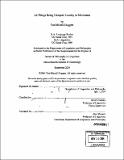All things being unequal : locality in movement
Author(s)
Doggett, Teal Bissell, 1975-
DownloadFull printable version (8.343Mb)
Other Contributors
Massachusetts Institute of Technology. Dept. of Linguistics and Philosophy.
Advisor
David Pesetsky.
Terms of use
Metadata
Show full item recordAbstract
In this thesis I demonstrate that a simplified theory of locality \ has greater success in accounting for locality in movement than more complicated alternatives that have been suggested. In particular, I argue that closeness should not be relativized to minimal domains, and that locality in movement follows from restrictions on Agree, but not on Move itself. Data is drawn from Locative Inversion in English, passivization in ditransitive verb phrases and constructions which involve movement to multiple specifiers of a single head. I show that the constructions that have previously been claimed to necessitate the notion of equidistance do not in fact provide motivation for this concept. Instead, further investigation of these constructions actually provides evidence for the elimination of equidistance from the grammar. I further argue that movement past a existing specifier to a higher specifier of the same head is grammatical, and that data which has been argued to show that this movement is prohibited can be given another analysis. This follows if Move, in contrast to Agree, is not subject to locality constraints. The streamlined theory of locality proposed here therefore ultimately accounts for a wider body of data than any of the more complicated alternatives.
Description
Thesis (Ph. D.)--Massachusetts Institute of Technology, Dept. of Linguistics and Philosophy, 2004. Includes bibliographical references (p. 155-158).
Date issued
2004Department
Massachusetts Institute of Technology. Department of Linguistics and PhilosophyPublisher
Massachusetts Institute of Technology
Keywords
Linguistics and Philosophy.